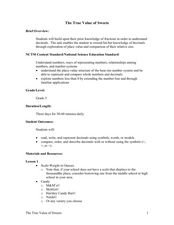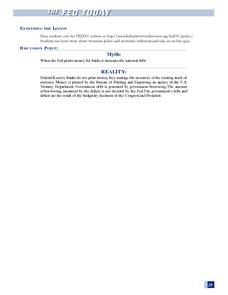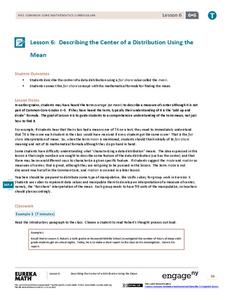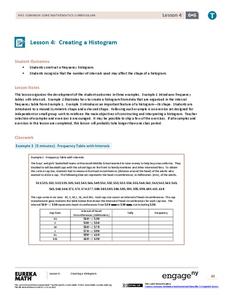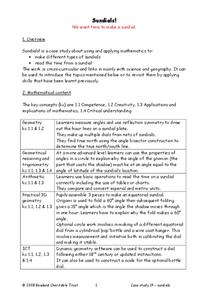Curated OER
Inventions 2: The Impact
Tomorrow's engineers visit an intriguing website about inventions that have changed the way we live. Biographies of child inventors on the suggested website aren't easy to find, so make sure to find some stories to share in place of...
Rainforest Alliance
Colombia Biodiversity
How diverse is the rainforest? How much more diverse is a rain forest than a temperate forest? Explore these focus questions in a lesson that explores the plants, animals, and insects in forests. After listening to a reading...
Curated OER
Matchstick Math: Using Manipulatives to Model Linear, Quadratic, and Exponential Functions
Playing with matches (unlit, of course) becomes an engaging learning experience in this fun instructional unit. Teach pupils how to apply properties of exponential functions to solve problems. They differentiate between quadratic and...
Curated OER
The True Value of Sweets
Measure your pupil's learning in a instructional activity designed to explore decimals by weighing different candies on a scale and recording the weight. Small groups then compare and order the decimal weights on a number line to show...
Teach Engineering
Organic Solar Energy and Berries
You can eat a solar cell? A unit on solar energy begins with a discussion about organic solar cells, followed by directions on how to build your own. After following the teacher's directions to build an anthocyanin...
James Madison Memorial Fellowship Foundation
Application of the Principles of the Constitution
If you want to challenge your US government class, this assignment requires them to identify a contemporary issue or event that reflects the four main principles of the Constitution (federalism, separation of powers, protection of...
California Academy of Science
Tropical Belt
Where in the world is the equator? Explore a world map with your class, coloring in oceans, continents, and rainforests while locating the three major lines of latitude: the equator, Tropic of Cancer, and Tropic of Capricorn. Discuss how...
Berkshire Museum
Nature Journaling: Experience the Outdoors Through Writing and Drawing
Step into the great outdoors and develop young scientists' skills of observation with a nature journaling lesson plan. Given a specific focus or goal, children practice making and recording observations of nature through written...
Federal Reserve Bank
The Fed's Role in Making and Setting Monetary Policy: Part 2
How does the Federal Open Market Committee work to formulate the nation's monetary policy in the United States? As the second segment of a lesson on the role of the Fed in setting monetary policy, class members will learn about open...
Polytechnic Institute of NYU
Potential vs. Kinetic Energy
Legos in science class? Watch your pupils fall in love with this activity. After learning to measure potential and kinetic energy, young scientists create their own ramps using Lego Mindstorm sensors and software.
EngageNY
Describing the Center of a Distribution Using the Mean
Everyone does their fair share. The sixth segment in a 22-part unit presents the mean as a fair share. Groups build a conceptual understanding of the mean of a data set, rather than simply learn an algorithm. Learners use the...
EngageNY
Creating a Histogram
Display data over a larger interval. The fourth segment in a 22-part unit introduces histograms and plotting data within intervals to the class. Pupils create frequency tables with predefined intervals to build histograms. They describe...
Polar Trec
Ozone Data Comparison over the South Pole
Did you know the hole in the ozone is seasonal and filled by January every year? The lesson uses scientific measurements of the ozone over the South Pole to understand patterns. Scholars learn that the hole grew bigger annually before...
Council for Economic Education
Employment Data: Is the Economy Healthy?
Low unemployment is an indicator of a healthy economy—right? Current employment data and research leads scholars on a quest to find the true health of the economy. They analyze research on Payroll Employment Data and watch a short video...
Curated OER
Paper Weaving
Practice the native concept of weaving with traditional classroom items. Using assorted colors of construction paper, your class will simulate how to weave. This is a great activity to connect to a Native American, Mexican, or other...
Curated OER
Household Conservation/Efficiency
Hook your class up to an online home energy usage calculator so that they can estimate the amount used per month by their families. Then give them Watt meters with which they will measure the power consumption of several small...
Rivanna Regional Stormwater Education Partnership
Invisible Passengers
How does water pollution affect the organisms living in the water? Use three science experiments to examine how erosion and other pollutants can affect water quality. Each experiment focuses on a different aspect of pollution and...
Howard Hughes Medical Institute
The Day the Mesozoic Died
While this is not the traditional, step-by-step lesson plan, it is chock-full of material that you can easily incorporate into your earth history unit. Its main purpose is to serve as a guide to using a three-part film, The Day the...
Curated OER
Roller Coasters
Twisting and turning through the sky, roller coasters are popular attractions at amusement parks around the world, but how exactly do they work? Explore the physics behind these thrilling rides with an engineering design activity....
Utah Education Network (UEN)
Microwave Magic
The microwave is a staple in many American households, but how exactly does it work? Approach this question from a scientific and practical standpoint, and discover cooking strategies, recipes, and methodologies for the standard...
Bowland
Sundials!
Time to learn about sundials. Scholars see how to build sundials after learning about Earth's rotation and its relation to time. The unit describes several different types of possible sundials, so choose the one that fits your needs — or...
Mathematics Assessment Project
Modeling Motion: Rolling Cups
Connect the size of a rolling cup to the size of circle it makes. Pupils view videos of cups of different sizes rolling in a circle. Using the videos and additional data, they attempt to determine a relationship between cup...
Anti-Defamation League
Shirley Chisholm: Unbought, Unbossed and Unforgotten
A 13-page packet introduces high schoolers to a lady of amazing firsts. Shirley Chisholm was the first Black woman elected to Congress, the first Black woman to run for President of the United States, and a leader of the Women's Rights...
Curated OER
All About Me
Third graders investigate the use of centimeters while measuring items with rulers which they construct. They examine the need for standard units of measure. They estimate the length of body parts before making the actual measurements.
Other popular searches
- Units Measurement
- Customary Units of Measurement
- Units of Measurement
- Nonstandard Measurement Units
- Si Units of Measurement
- Standard Units Measurement
- Arbitrary Units Measurement
- Standard Units of Measurement
- Converting Measurement Units
- Customary Units Measurement
- Historic Units of Measurement
- Linear Units of Measurement



